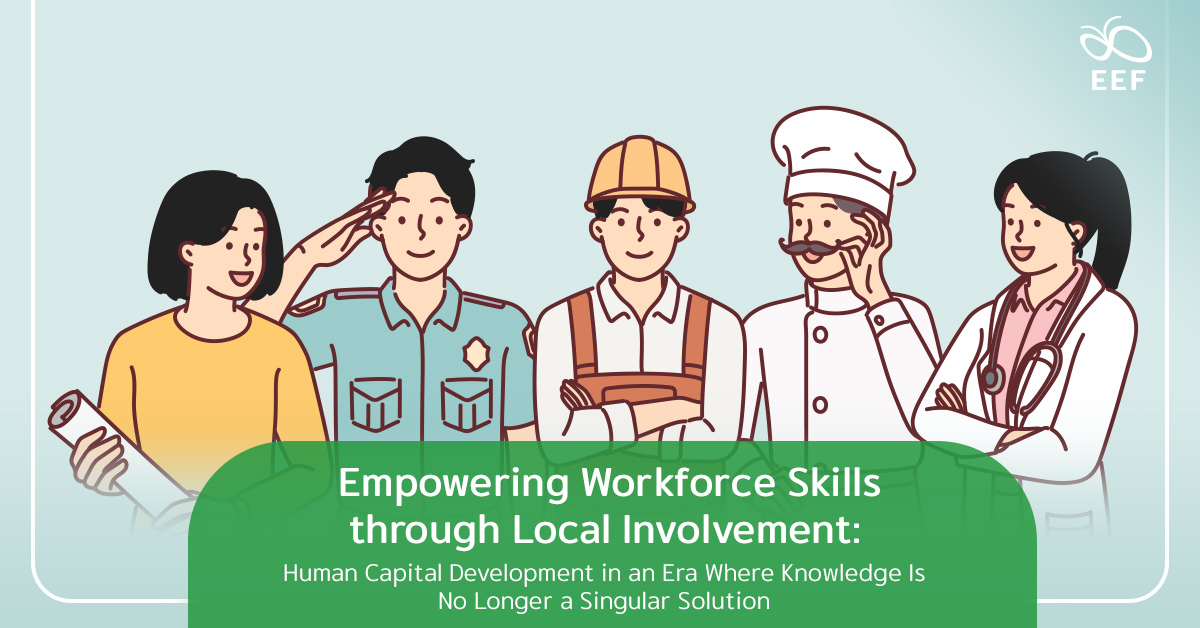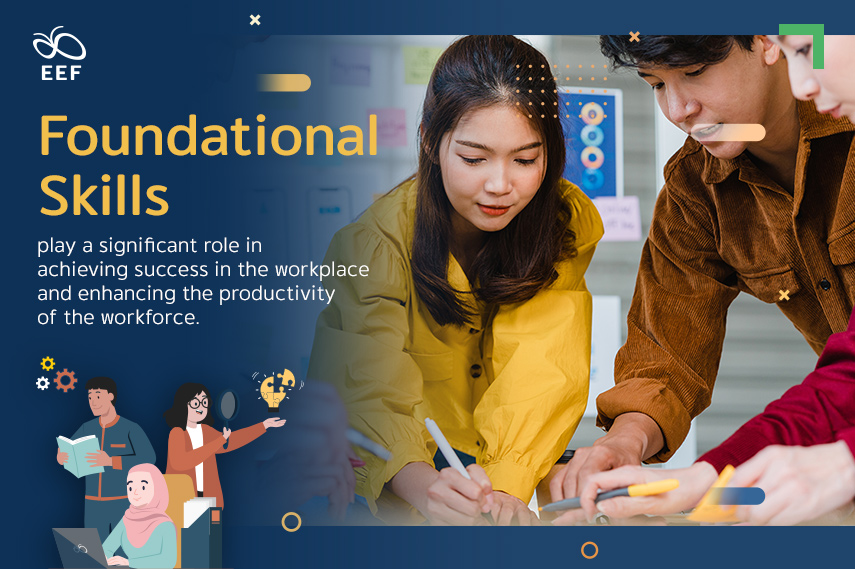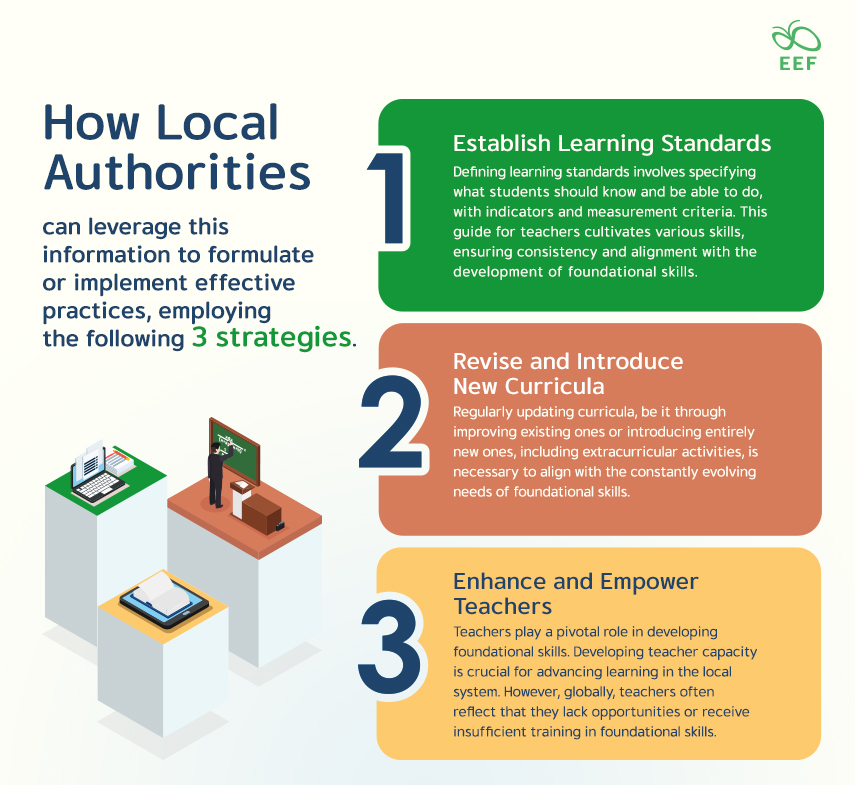
No longer is the educational agenda singularly focused on enriching academic knowledge within the classroom; instead, it extends to equipping foundational skills of human capital, including the lifelong learning imperative that embraces a diverse population of all ages and genders. The current emphasis on transforming learning to meet contemporary needs underscores the crucial role played by “localities” as the driving force in developing foundational skills — given the fact that individuals working at the grassroots level possess an unparalleled understanding of contextual nuances within their respective areas, uniquely positioning them to address challenges effectively. However, a pivotal question emerges: how can localities play an active role in fostering the development of foundational skills when such development has traditionally been overseen by the central government? To address this inquiry, attention must be directed towards the pressing concern of foundational skills within the working-age population, specifically tailored to meet the unique needs of their respective localities.

Currently, Thailand is home to a working-age population outside the formal system, surpassing 20.2 million. Within this group, a majority has completed education below lower secondary levels, with 67% categorized as semi-skilled or unskilled labor. This demographic faces economic instability and societal protection challenges, prompting an overarching question: how can assistance be extended to this substantial population, constituting the majority in each locality? Simultaneously, a shift in focus from the working-age population to the younger generation raises concerns about a significant number of Thai youth categorized as “Not in Education, Employment, or Training” (NEETs), amounting to 1.4 million or 14% of the total youth population, with an annual growth rate of 1%. The potential implications are significant, and if not properly, this number could escalate further in the coming years.
In light of these circumstances, the pressing matter of skill development for youth outside the institutionalized education system, ready to enter the workforce, has come to the forefront. Yet, the pivotal question persists, demanding collective consideration: how can these youth be effectively supported? Addressing the challenges related to educational disparity and human capital development requires a comprehensive approach and cannot be effectively tackled by a single entity; collaboration is key, particularly at the local levels, where abundant resources facilitate cohesive efforts, with international organizations also playing a significant role. Simultaneously, the situation concerning youth and working-age populations at the local levels pose intricate and collective challenges. Solutions must be collectively devised to assist these youth in overcoming the pitfalls of educational and skill-based disparities.
According to the research conducted by Amazon and Gallup, which investigated the impact of digital transformation on opportunities spanning 19 countries globally, Thailand currently faces a situation where approximately 50% of its workforce lacks digital skills, while another 18% possesses only basic digital skills. If individuals in the labor market were to be asked about their occupations, a significant number would not require digital skills, which are foundational skills crucial for human capital. This indicates that employers do not necessarily seek digital skills to enhance productivity or foster innovation. On the contrary, although employers may not require digital skills for increased productivity or innovation, they perceive the lack of such skills among the workforce as a significant challenge. This includes deficiencies in other skills such as communication and analytical skills, which are equally essential foundational skills.

“Foundational skills” is a broad term with various definitions, essentially referring to foundational skills that are incrementally progressive, starting from the basics, and transferable across different contexts of life, proving highly beneficial in various aspects. Delving deeper, these foundational skills comprise several components, with literacy skills, socioemotional skills, and digital skills being key elements. Literacy Skills, often regarded as the fundamental of all the foundational skills, extend beyond the basic act of reading. They encompass the practical application of acquired information in various aspects of daily life, serving as the cornerstone for developing a range of other essential skills. Proficiency in literacy empowers individuals to effectively interpret, apply, and communicate information, laying the groundwork for overall functional proficiency and success in various domains.
Socioemotional Skills, considered paramount, involve the adept management of one’s emotions, the cultivation of empathy, the exploration of diverse perspectives, and a deep understanding of the ever-changing world. These skills not only enhance personal well-being but also foster harmonious relationships and a nuanced approach to problem-solving, promoting a more compassionate and adaptable mindset. Meanwhile, Digital Skills, whose significance has been steadily growing, encompass a range of abilities related to managing, comprehending, and evaluating relevant information in the digital realm. As the world becomes increasingly interconnected through technology, proficiency in digital skills becomes crucial for effective communication, decision-making, and participation in contemporary society.

These foundational skills are of paramount importance; they play a significant role in achieving success in the workplace and enhancing the productivity of the workforce. Additionally, they significantly contribute to expanding opportunities for education, lifelong learning, and improving health outcomes, fostering innovation. Moreover, these skills drive civic engagement, influencing electoral choices or voluntary work. Prioritizing foundational skills raises the pivotal question: can these skills be developed or enhanced?
The answer is “certainly.” There are numerous ways to enhance these skills, ranging from formal education and basic training during various learning stages, to extracurricular activities. The working-age population can also revitalize these skills through lifelong learning and various training programs, both formal and informal. Another crucial issue is how local authorities can leverage this information to formulate or implement effective practices, employing the following 3 strategies.
- Establish Learning Standards: defining learning standards involves specifying what students should know and be able to do, with indicators and measurement criteria. This guide for teachers cultivates various skills, ensuring consistency and alignment with the development of foundational skills.
- Revise and IntroduceNew Curricula: regularly updating curricula, be it through improving existing ones or introducing entirely new ones, including extracurricular activities, is necessary to align with the constantly evolving needs of foundational skills.
- Enhance and Empower Teachers: teachers play a pivotal role in developing foundational skills. Developing teacher capacity is crucial for advancing learning in the local system. However, globally, teachers often reflect that they lack opportunities or receive insufficient training in foundational skills.

Teachers are held to such high expectations, yet they often perceive themselves as lacking the necessary knowledge, skills, and competencies. Therefore, teacher skill development becomes crucial. Another aspect of enhancing teacher capabilities in teaching foundational skills is the “attitude” of teachers towards teaching. Some may find their workload overwhelming for imparting these skills, emphasizing the need to provide tools and guidance for teachers to integrate foundational skills into the curricula.
Local authorities play a significant role in empowering teachers and students through various learning practices. They are in the best position to adapt and leverage learning projects suitable for their respective contexts, formulating policies appropriate for the local environments. Notably, Thailand has cities already connected to the global learning network, serving as a vital platform for advancing the skills of the new era and developing innovative learning ecosystems. Additionally, there are numerous pioneering projects at the regional and provincial levels, acting as crucial platforms for advancing skill development and learning.

Literacy skills, socioemotional skills, and digital skills, coupled with a commitment to continuous learning, prove indispensable in the contemporary workforce. Within any organization, it is evident that employees may share similar academic qualifications, yet some excel while others struggle. This discrepancy arises from the importance of skills beyond mere knowledge. Without these skills, the knowledge acquired during formal education may become obsolete as the world evolves. However, these essential skills can be continually honed and serve as the key to success in the future.
The current challenge extends beyond the realm of educational institutions and addresses the workforces. Revitalizing them is pivotal in propelling the country forward. As the working-age population is reintegrated back into education, opportunities must be created for those employed to learn without returning to the confines of educational institutions. This necessitates the establishment of an environment where individuals desiring education can pursue it while still engaged in their respective professions.
Waiting for centralized efforts to address this issue would take a long time to yield results. Therefore, localities must be invited to take the lead in nurturing their populations, especially if these localities are governed by local authorities elected by the people. This will significantly contribute to improving income, career advancement, and overall well-being— a reward, progress, and responsibility bestowed upon those elected by the people.
The solution does not lie in building new schools but rather in collaborative planning and information sharing among diverse organizations. This collaborative effort should be guided by shared beliefs and objectives, all aligned with the specific context of each locality. The forthcoming actions entail ongoing academic research and collaboration to identify economically disadvantaged children aspiring for education. Collaborations with various colleges will further focus on enhancing socioemotional skills and practical life skills for these underprivileged youth, propelling them toward a brighter future.

In redefining education for the contemporary era, localities take center stage in cultivating foundational skills. With over 20.2 million working-age individuals outside the formal system, collaboration at the grassroots becomes pivotal. Addressing literacy, socioemotional, and digital skills, local authorities play a central role in aligning curricula and empowering teachers. This collective effort, guided by elected officials, propels a transformative journey where continuous skill development fosters not only individual empowerment but also economic progress and societal well-being. Through collaborative planning and information sharing, localities, devoid of the need for new schools, emerge as architects of a brighter future for Thailand’s diverse workforce. This perfectly encapsulates the mission of the Equitable Education Fund (EEF) Thailand, which is to reduce education inequality through research, collaboration, and support for children, youth, and adults in need.

